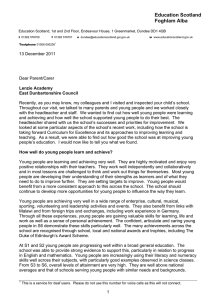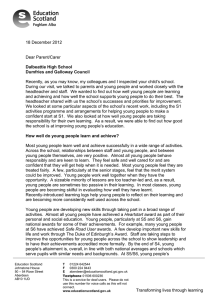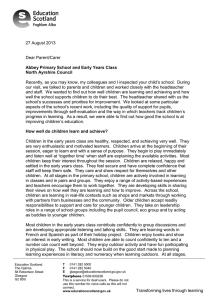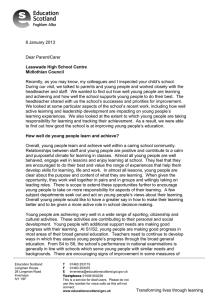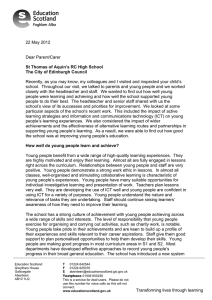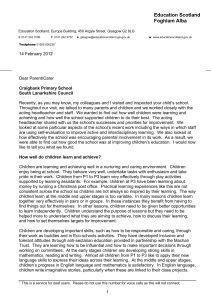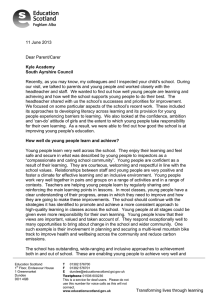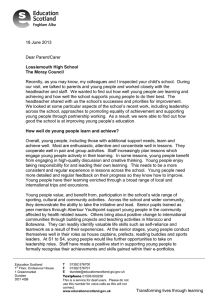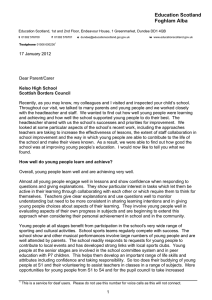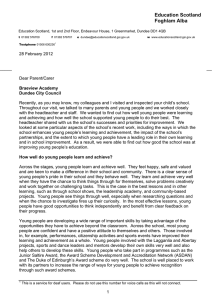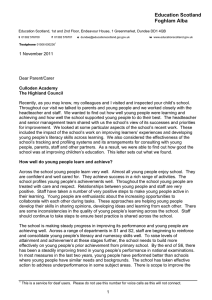Education Scotland Foghlam Alba
advertisement
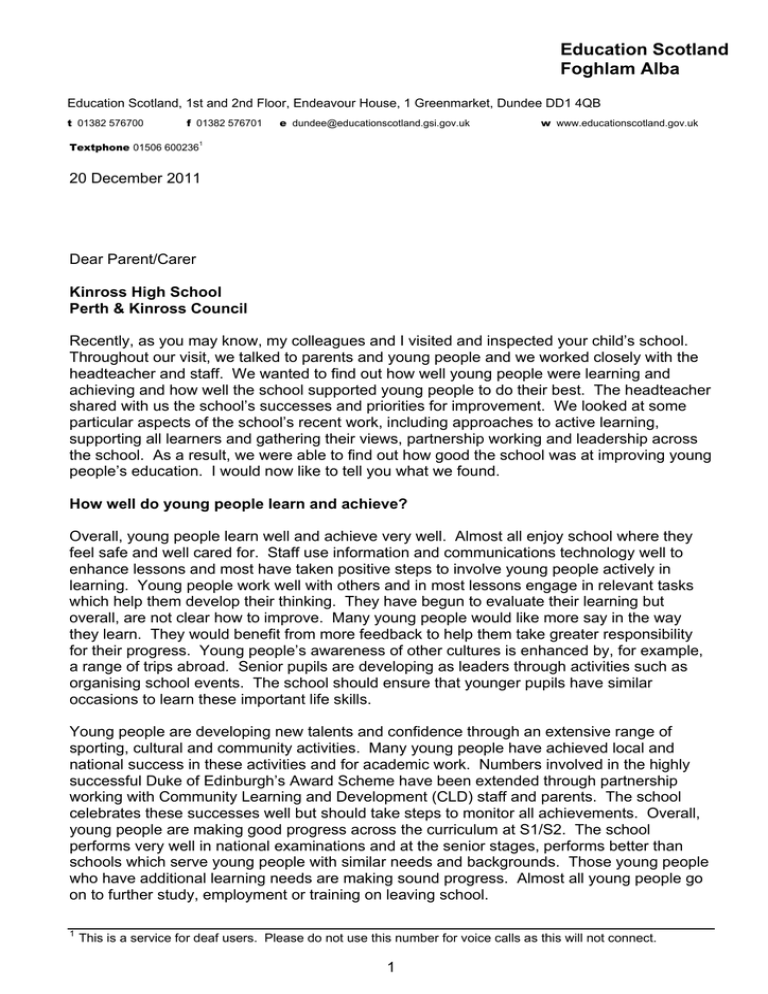
Education Scotland Foghlam Alba Education Scotland, 1st and 2nd Floor, Endeavour House, 1 Greenmarket, Dundee DD1 4QB t 01382 576700 f 01382 576701 Textphone 01506 600236 e dundee@educationscotland.gsi.gov.uk w www.educationscotland.gov.uk 1 20 December 2011 Dear Parent/Carer Kinross High School Perth & Kinross Council Recently, as you may know, my colleagues and I visited and inspected your child’s school. Throughout our visit, we talked to parents and young people and we worked closely with the headteacher and staff. We wanted to find out how well young people were learning and achieving and how well the school supported young people to do their best. The headteacher shared with us the school’s successes and priorities for improvement. We looked at some particular aspects of the school’s recent work, including approaches to active learning, supporting all learners and gathering their views, partnership working and leadership across the school. As a result, we were able to find out how good the school was at improving young people’s education. I would now like to tell you what we found. How well do young people learn and achieve? Overall, young people learn well and achieve very well. Almost all enjoy school where they feel safe and well cared for. Staff use information and communications technology well to enhance lessons and most have taken positive steps to involve young people actively in learning. Young people work well with others and in most lessons engage in relevant tasks which help them develop their thinking. They have begun to evaluate their learning but overall, are not clear how to improve. Many young people would like more say in the way they learn. They would benefit from more feedback to help them take greater responsibility for their progress. Young people’s awareness of other cultures is enhanced by, for example, a range of trips abroad. Senior pupils are developing as leaders through activities such as organising school events. The school should ensure that younger pupils have similar occasions to learn these important life skills. Young people are developing new talents and confidence through an extensive range of sporting, cultural and community activities. Many young people have achieved local and national success in these activities and for academic work. Numbers involved in the highly successful Duke of Edinburgh’s Award Scheme have been extended through partnership working with Community Learning and Development (CLD) staff and parents. The school celebrates these successes well but should take steps to monitor all achievements. Overall, young people are making good progress across the curriculum at S1/S2. The school performs very well in national examinations and at the senior stages, performs better than schools which serve young people with similar needs and backgrounds. Those young people who have additional learning needs are making sound progress. Almost all young people go on to further study, employment or training on leaving school. 1 This is a service for deaf users. Please do not use this number for voice calls as this will not connect. 1 How well does the school support young people to develop and learn? The school supports young people well to develop and learn. It has a broad curriculum with a high degree of choice which meets differing needs and interests well. Partnerships with CLD staff have extended learning and reinforced the school’s sense of community. Teachers have revised courses at S1/S2 to make learning more relevant and enjoyable. In some subjects, teachers are focusing well on developing young people’s skills as learners. These approaches should be shared more widely. The curriculum is enhanced by a wide range of visitors to the school and trips which support learning. The school provides many opportunities for young people to grow as citizens through charity fundraising and volunteering with local partners such as the children’s hospice. There are a few vocational courses made possible by good links with local colleges. There is scope to extend these and forge closer links with local employers. Young people are beginning to make connections in their learning through a few projects which make links between different subject areas, such as the Growing up with Loch Leven project. The school must ensure these projects deepen young people’s understanding in those areas. Senior managers need to continue to increase the pace of change and review approaches to building skills in literacy, numeracy and health and wellbeing across learning. Some departments have forged links with primary schools to ensure progression in learning from P7. This needs to be extended across all subject areas to raise achievement levels further at S1/S2. Young people feel that help is always there if they need it. Support staff know the young people they work with very well. They work very effectively with partner agencies to ensure that young people have the most appropriate learning and pastoral support. They form positive pastoral links with primary schools to ensure young people settle in well to high school. Class teachers receive good information on young people’s learning needs. Tutor Support Groups offer the opportunity for young people to support each other but the school should ensure this time is used effectively. Teachers provide tasks and activities which suit most young people but there is scope to challenge young people more at S1 and S2 and to provide tasks more suited to young people who need extra help in their learning. A number of parents would like more frequent information on their child’s learning. How well does the school improve the quality of its work? Overall, we are confident that the school has the capacity to continue to improve the quality of its work. Staff are committed to continuous school improvement. Teachers reflect on their lessons and increasingly share good practice. Senior managers encourage staff to visit other departments and schools to share ideas. Departments engage in regular, planned discussions on their work and this is helping improve outcomes for learners. Teachers are supported in developing new ideas and a number of staff lead clubs, working groups and initiatives such as cooperative learning. The school has introduced a number of very helpful approaches to finding out what it does well and what needs to improve. Teachers and senior managers track performance at S3 to S6 carefully. There is now a need for a clearer overview of performance at S1/S2 to help the school judge the impact of developments better. Senior managers need to improve the way they gather and take account of the views of parents, partners and young people in improving the work of the school. The school has developed a range of initiatives to improve its work in recent years including approaches to self-evaluation. The senior management team must use the data it now has to prioritise next steps and communicate them more clearly to all stakeholders. 2 This inspection of your school found the following key strengths. • • • • Consistently high attainment, particularly at S5/S6. The wide range of opportunities for personal development. Partnerships which support and enhance learning. Commitment of many staff to improving the work of the school. We discussed with staff and the education authority how they might continue to improve the school. This is what we agreed with them. • • • • Improve the consistency of approaches to developing literacy, numeracy and health and wellbeing across the school. Build more effectively on young people’s prior learning in primary school. Take greater account of the views of stakeholders in establishing priorities for the school. Ensure self-evaluation approaches lead to consistently high-quality learning experiences. What happens at the end of the inspection? We are satisfied with the overall quality of provision. We are confident that the school’s self-evaluation processes are leading to improvements. As a result, we will make no further visits in connection with this inspection. The local authority will inform parents about the school’s progress as part of the authority's arrangements for reporting to parents on the quality of its schools. Fiona A Pate HM Inspector Additional inspection evidence, such as details of the quality indicator evaluations, for your school can be found on the Education Scotland website at http://www.hmie.gov.uk/ViewEstablishment.aspx?id=9169&type=3. Please contact us if you want to know how to get the report in a different format, for example, in a translation. You can contact us at enquiries@educationscotland.gsi.gov.uk or write to us at BMCT, Education Scotland, Denholm House, Almondvale Business Park, Almondvale Way, Livingston EH54 6GA. If you want to give us feedback or make a complaint about our work, please contact 01506 600200, or write to us at the above address or e-mail: feedback@educationscotland.gsi.gov.uk. 3
